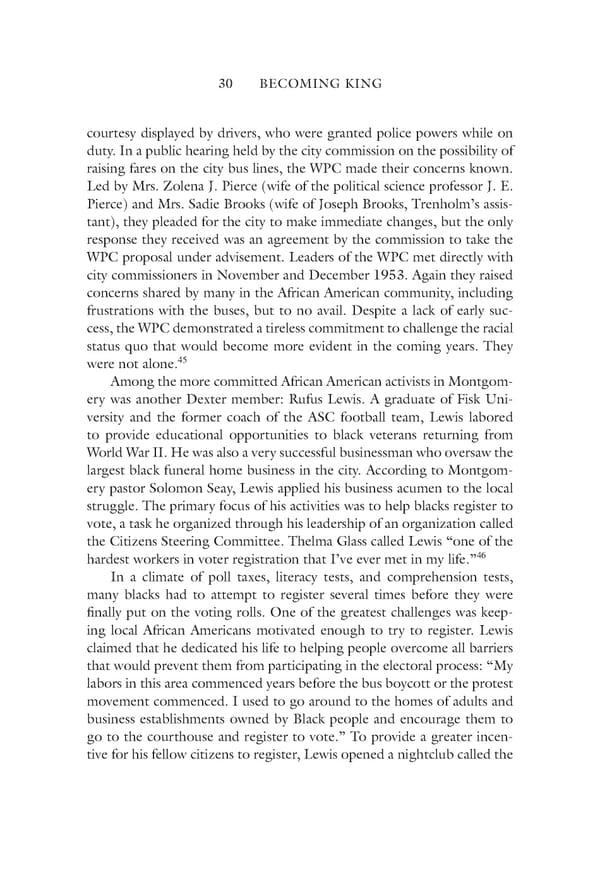30 BECOMING KING courtesy displayed by drivers, who were granted police powers while on duty. In a public hearing held by the city commission on the possibility of raising fares on the city bus lines, the WPC made their concerns known. Led by Mrs. Zolena J. Pierce (wife of the political science professor J. E. Pierce) and Mrs. Sadie Brooks (wife of Joseph Brooks, Trenholm’s assis- tant), they pleaded for the city to make immediate changes, but the only response they received was an agreement by the commission to take the WPC proposal under advisement. Leaders of the WPC met directly with city commissioners in November and December 1953. Again they raised concerns shared by many in the African American community, including frustrations with the buses, but to no avail. Despite a lack of early suc- cess, the WPC demonstrated a tireless commitment to challenge the racial status quo that would become more evident in the coming years. They were not alone.45 Among the more committed African American activists in Montgom- ery was another Dexter member: Rufus Lewis. A graduate of Fisk Uni- versity and the former coach of the ASC football team, Lewis labored to provide educational opportunities to black veterans returning from World War II. He was also a very successful businessman who oversaw the largest black funeral home business in the city. According to Montgom- ery pastor Solomon Seay, Lewis applied his business acumen to the local struggle. The primary focus of his activities was to help blacks register to vote, a task he organized through his leadership of an organization called the Citizens Steering Committee. Thelma Glass called Lewis “one of the 46 hardest workers in voter registration that I’ve ever met in my life.” In a climate of poll taxes, literacy tests, and comprehension tests, many blacks had to attempt to register several times before they were finally put on the voting rolls. One of the greatest challenges was keep- ing local African Americans motivated enough to try to register. Lewis claimed that he dedicated his life to helping people overcome all barriers that would prevent them from participating in the electoral process: “My labors in this area commenced years before the bus boycott or the protest movement commenced. I used to go around to the homes of adults and business establishments owned by Black people and encourage them to go to the courthouse and register to vote.” To provide a greater incen- tive for his fellow citizens to register, Lewis opened a nightclub called the
 Becoming King: Martin Luther King Jr. Page 50 Page 52
Becoming King: Martin Luther King Jr. Page 50 Page 52